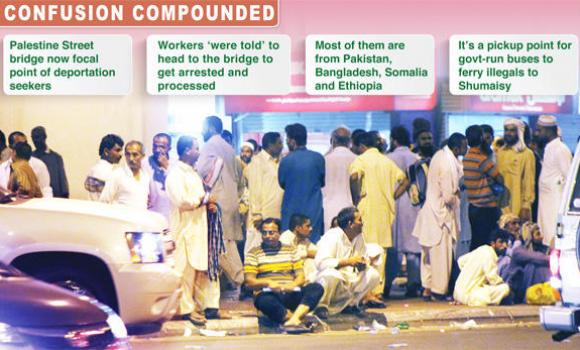
Jeddah, Nov 8: Jeddah residents have called on the government to move hundreds of illegals from under a bridge at the intersection of Palestine and Prince Majed streets.
About 400 workers have been squatting at the location for days waiting for buses to transport them to the Shumaisi deportation center. Many were sitting on the ground, outside restaurants and moving in-between the traffic.
There had initially been many more expatriates, mainly Indonesians, under the bridge when the amnesty ended on Nov. 3. They had been told by their consulates to wait there for transport, and were later taken in buses to the deportation center.
There are now mostly workers from Pakistan, Bangladesh, Somalia and Ethiopia under the bridge.
Local residents and owners of shops and restaurants have complained that the workers are causing problems in the area. The constant noise late into the night disturbs them, they said.
Saleh, a Saudi resident, said he has great difficulty reaching his home in the afternoon because of the heavy traffic and many cars parked in the area. He said the workers have littered the area.
“I suggest another place be found for workers to wait.” He said the deportation and foreign affairs officials should work together to ensure the workers are taken to the center for processing.
Some of the stranded workers told Arab News that they had been waiting for two days for buses to take them to the deportation center.
Arshad, a Pakistani worker, said that he came to the bridge with compatriots because they were told there would be transport for them.
Saeed, an illegal worker from Somalia, said he had been waiting for almost 12 hours and had not found anyone able to give him more information. “We want to leave this country because we could not correct our status. It is hard for us here because we have to sleep on the ground and there are no basic facilities.”
Zafar, another Pakistani, said he had been waiting for two days and wished he had never come. He said most of the workers wanted their embassies and consulates to organize their deportation procedures.
“We are suffering a lot here especially during the hot midday hours. Some of us came here with families and children. What's making things worse is that no one has been able to tell us how long we'd have to wait.
“Today around six to seven buses came early in the morning and took some workers to the deportation center,” he said.
There was a large contingent of policemen stationed around the area to provide security on Thursday.
Arab News tried to get a statement from the head of the police officers there, but he refused because he was not authorized to do so.





Comments
Add new comment